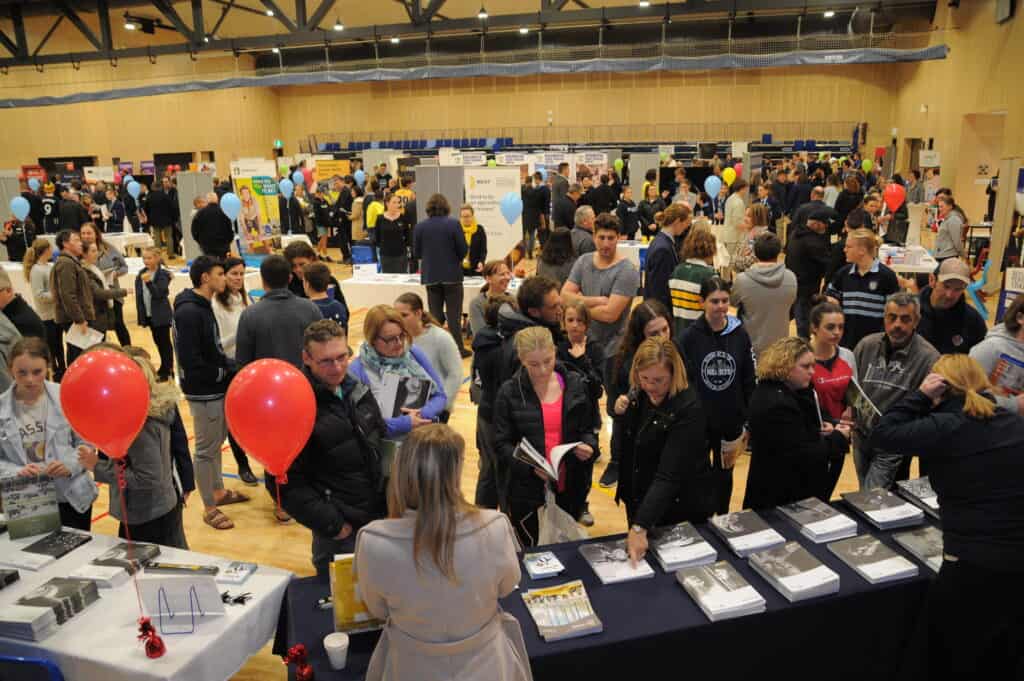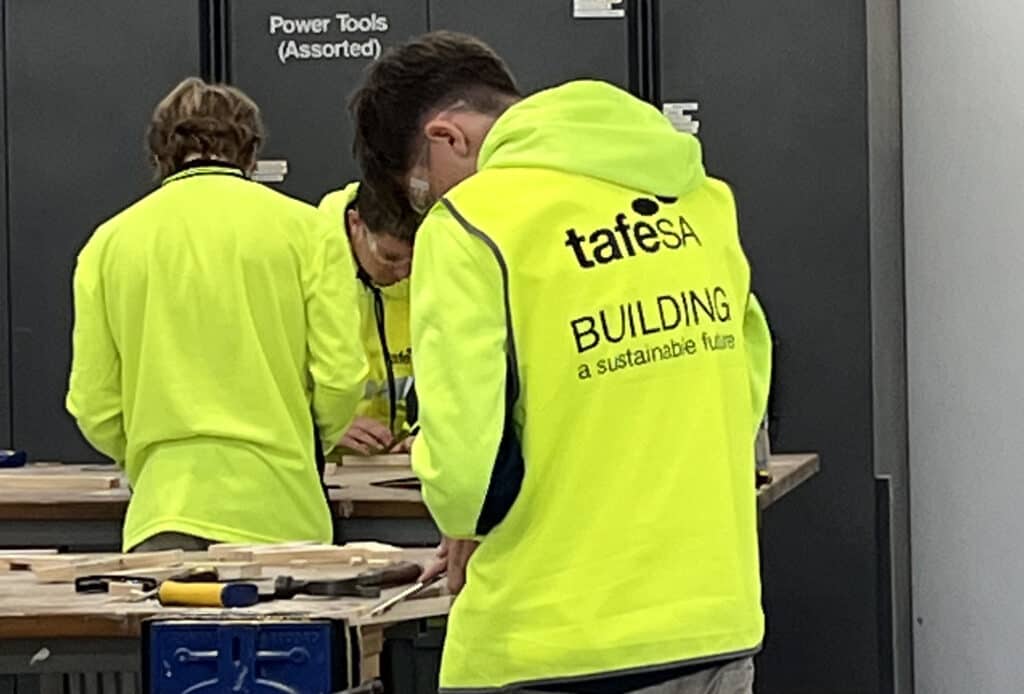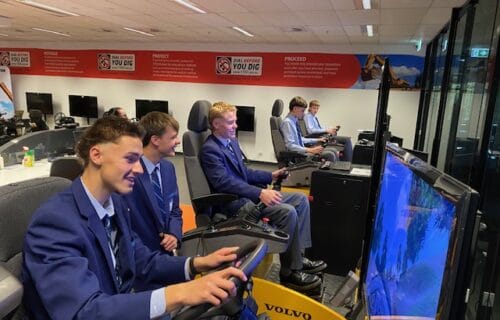
The winning team of the 2023 Heaviest Catch: (L-R) Family members David Farrer (Father), Graham Farrer (Grandfather), Year 11 student, Jed Farrer, and Andrew Farrer (Uncle).
To our Sacred Heart College community
Jed following his passion

Careers can often emerge from a hobby or passion that a person has; sometimes it can take a while for a person to recognise this as is witnessed in some of the reality cooking and building shows on television. Here we see people with seemingly very viable careers looking to satisfy their long held passion or interest in a completely different area.
In South Australia, aquaculture and tuna farming, fishing and sales are very strong industries, particularly in Port Lincoln and the West Coast, where a number of our boarders are from. The following story about Year 11 student, Jed Farrer shows his interest and passion for fishing, which is shared by his father, grandfather and uncle, demonstrating how hobbies can bond and develop family spirit, another highly valued Marist characteristic.
Following on from winning the heaviest catch in 2021 and 2022, Jed won the Best Junior Angler at this year’s catch and release competition, held 24-26 March. This is a hat-trick for Jed, who also won this title in 2021 and 2022.
Jed has been a keen fisherman since he was very young and shares this passion with his dad, grandfather and uncle. He has taken part in the Port Lincoln Tuna Classic since 2021 and his family has been involved since its inception in 2006.
When asked if he has any tips for landing a tuna Jed said, “Basically you need to be ready to grab the reel at any time. You watch for birds flying above a patch of water because that normally means there would be a school of baitfish in the area and usually a school of tuna will be hunting for the bait fish. Then you have your lines out and manoeuvre your boat where the birds are diving and you will usually get a bunch of hook ups with tuna. Once you have a hook up your work starts to land the fish.”
The SHC Careers & Pathways Expo is back!

Sacred Heart College is pleased to announce the return of the Careers & Pathways Expo on campus!
Wednesday, 5 July 2023
6.00 – 7.00pm
Br Joseph McAteer Centre, Marcellin Campus
We invite all students and families to come and chat to the experts about further study and career pathways. Below are the different categories available on the evening:
- Creative, Games, Animation, Visual Effects, Sound, Photography
- Chiropractic
- Psychology, Humanities, Social Science
- Business, Accounting
- Gap Year, Exchange
- Hair, Beauty
- Nursing, Aged Care, Disability Services
- Ministry, Theology, Education, Counselling
- Hospitality
- VET Courses
- Agriculture, Horticulture, Landscaping, Timber, Building
- Defence, Aerospace, Security, Aviation
- Policing, Fire Fighting
- Tertiary Accommodation
- Music
- Sport, Health
- Apprenticeships, Traineeships.
And of course, visit the universities and TAFE who will be available to speak about the breadth of courses and programs on offer.
We look forward to seeing you there.
Key dates
-
Work Experience for 2023
BEFORE CONSIDERING WORK EXPERIENCE PLEASE BE AWARE OF THE FOLLOWING:
It is a legal requirement that prior to commencing Work Experience students are inducted in the following areas: Work Health and Safety Act 2012 SA, Children and Young People (Safety) Act 2017 SA, Equal Opportunity Act 1984 SA, Child Safety (Prohibited Persons) Act 2016 SA and Fair Work Act 2009 (Cth).
Adequate time (approximately 5 hours) should be allocated to cover these topics effectively and students need to demonstrate their understanding. This induction is done by the school and is consistent with our Duty of Care to ensure that no student is placed where they may not be safe physically or psychologically.
In addition to this, the Work Experience form must be signed by the student, work placement provider, parent/guardian (all arranged by the student) and finally the principal or delegate (arranged by the school). The original Work Experience Agreement form then becomes a legal contract which sets the school insurance cover in place and must be retained by the school.
The school must also provide a contact person who is responsible for each student for the duration of their placement.
Work Experience is a very valuable opportunity for most students however, it does take time to ensure that the above expectations are met. We are happy to accommodate students in the times allocated. Please do not cause yourself or the College embarrassment by making other arrangements and then asking for exceptions to be made.
Students who wish to do Work Experience during 2023 are advised that the dates are:
10 – 14 July
Deadline for paperwork: 9 June9 – 13 October
Deadline for paperwork: 1 September20 – 24 November (Optional Work Experience Year 12s only)
Deadline for paperwork: 20 October4 – 8 December
Deadline for paperwork: 3 NovemberPlease note this is general Work Experience only. Students undertaking a VET program will need to organise their VET work placement with the VET Office.
-
Defence Force Work Experience Programs
The Defence Force has some very exciting work experience opportunities coming up in the next few months for students aged 15 and over. Below are the details:
Air Force Aviation Program for Women
28-31 August 2023, RAAF Base Edinburgh
This job closes on 16 July 2023.
For more information, please click here.Air Force Aviation Program for Women
4-7 September 2023, RAAF Base Edinburgh
This job closes on 23 July 2023.
For more information, please click here.There are additional Work Experience Programs offered in South Australia. For more information and to apply, please visit their website here.
-
myfuture Insights – Managing career uncertainty and anxiety: the power of careers conversations (for parents/caregivers)
Webinar – 7 June 2023
Career uncertainty has been defined as the inability, as a teenager, to articulate a career ambition or occupational expectation for adult life. As transitions from school to further education, training or work have become more unpredictable, and employment markets more competitive and fluid, career uncertainty in young people, both in Australia and internationally, is increasingly common.
In this webinar, Dr Jo Gleeson (Monash University), lead author of the forthcoming myfuture Insights Paper ‘Managing career uncertainty and anxiety: the power of career conversations’, will talk about the findings of her research in this area, and share a questionnaire that can help you to facilitate career conversations with your child.
Find out more here.
-
Black Dog Institute – Navigating your teen’s mental health
8 June 2023
Normal mood swings or clinically depressed – can you tell the difference?
Understanding mental health is a minefield for many of us, but that’s where Black Dog Institute can help. Their presentation developed by experts has been designed to help you answer questions like this and gives you the knowledge and practical advice to:
- Identify depression from normal mood swings
- Understand the types of mental health concerns
- Recognise the symptoms of depression and anxiety
- Know when professional help is needed
- Understand the range of treatment options
- Have open, meaningful conversations
- Spot and monitor the warning signs.
Their free, 45 minute sessions are presented by community members with lived experience of mental illness. The presenters speak from the heart, sharing their personal story as well as our expert knowledge.
Find out more here.
-
WEP – Student exchange info session
Imagine making friends from all over the world, learning about yourself and the world around you and seeing sights you could only dream of!
Find out more here.
-
ADF – Women in Defence virtual information session
8 June 2023
Consider a career in the Navy, Army or Air Force and work alongside like minded, supportive, proud serving men and women.
Tune in for a virtual info session to speak with current serving women in Defence to learn more.
Find out more here.
-
NIE – Simulated UCAT Day Workshop, Adelaide
10 June 2023
If you are in Years 10, 11, 12 and considering sitting the UCAT in the future, then this program may be for you. The Simulated UCAT Workshop program can be a helpful preparation for the UCAT.
This event will be conducted by the National Institute of Education in partnership in partnership with UCAT Preparation Australia, and MICAS (Medical Interviews and Career Advice Services).
The workshop is primarily designed to cover fundamental techniques in navigating all five sections of the UCAT test and also for participants to gain a better understanding of their own level of preparedness for the test. Over the course of the years, the program has evolved into more comprehensive and holistic exercise, which not only achieves its primary goal, but it is also exposing students to a wealth of knowledge about all other aspects of the journey into a medical degree.
Find out more here.
-
AIE – Industry Experience Days
12 July 2023
AIE’s Industry Experience Day is a great opportunity for students in Years 10, 11 and 12 to learn about the local and international game development, 3D animation and visual effects industries. Students will get the opportunity to learn about the different pathways to get into the industry, what should be in a portfolio and will be able to get creative in practical workshops using industry-standard 3D animation and game development tools.
The sessions are run by industry professionals who have worked on some blockbuster games and films. Everything is provided for you to participate in the hands-on workshops and you will be using the same software that is used in the industry.
Find out more here.
Vocational Education and Training (VET) update
Try a Trade at Western Technical College

Numbers are at an all time high for Try a Trade. This term, 17 students commenced Try a Trade Construction where they have experienced bricklaying, carpentry, paving, tiling and White Card training.
In Term 3, a further 40+ students have enrolled in Try a Trade either Automotive, Construction, Electrotechnology, Engineering, Plumbing, Salon & Make up or Screen & Media/ICT/CAD. These students will receive a certificate of attendance which can be used as evidence of experience for the government subsidy available for the 2024 Certificate II courses in these areas.
To register your interest in a Try a Trade, please visit WTC – closing date Friday 16 June. Be quick as spots are filling up! Further information is available on SEQTA notices.
Childcare industry immersion day at Queensford College
Queensford College hosted a childcare industry immersion day in April. Fourteen Year 10 students from Sacred Heart College attended this day, all who are considering studying a Cert III Early Childhood Education and Care VET course in 2024. They learnt some hands-on skills and found out more about the industry and career opportunities from various trainers and specialists. Students received a certificate of attendance, which can be used as evidence of experience for the government subsidy available for the Cert III course.
If you are interested in a career in the childcare industry and missed this immersion day, there is another opportunity available on 19 June. Further information is available on SEQTA notices.
Civil Industry Immersion at Civil Train SA
Earlier this term, a few of our Year 10 students had the opportunity to attend a 3 hour interactive Civil Construction Industry immersion session. What is Civil Construction? It involves the building of bridges, roads, airports, railway lines.
Students had the opportunity to gain an interactive experience into the world of Civil Construction through gamified learning – operating a variety of simulated heavy machinery including an excavator, frontend loader and haul truck.
VET students’ Structured Work Placement – July school holidays
Any students planning to undertake a work placement in the July school holidays will need to submit a completed and signed Workplace Learning Agreement form to the VET Office by Friday, 23 June.
For any questions or to obtain a form, please contact vet@shc.sa.edu.au.
Sarah Benedictson
VET Coordinator
Tertiary updates
-
Bond University spotlight
Campuses and access
Bond University’s main campus is located in Robina on the Gold Coast, around 15 minutes south of the CBD. The campus is easily accessible by both bus and ferry, and has plenty of parking spaces for students commuting by car.
There are also separate dedicated health and sports learning and research facilities located nearby at Robina Hospital. Bond also has a teaching space in the Brisbane CBD.
Most of the paths and buildings across the campus are accessible by wheelchair, with major buildings containing lifts for access to upper floors.
Online Learning
Bond currently only offer postgraduate courses in law and arts online. Students looking to study at an undergraduate level will need to attend classes on-campus.Study Options
Bond offer undergraduate courses in most study areas, with the exception of education. They are well known for their small class sizes and unique three semester structure.Bond offer some combined degree options, meaning you can graduate in less time than it would take to study two qualifications separately.
The academic year is split across three 13-week long semesters, running from mid-January to early-December, with a 2-week break between each semester. There are no other optional semesters or teaching periods. Classes are not scheduled during Easter, ANZAC Day, or over the Christmas and New Year period. You can view the full academic calendar for the year here.
The structure of most courses at Bond is quite rigid, with subjects only offered in certain semesters and must be taken in a set order. You can find out more about specific courses and subjects here.
Accommodation and living
Bond University offer a variety of on-campus accommodation options, including both individual and shared options.2023 prices vary between $2,775 per semester (roughly $215 per week) to $4,350 per semester (roughly $340 per week) per person, depending on size and location. All on-campus students must also purchase a dining plan, a minimum separate cost of $2,000 per semester (around $150 per week). Fees must be paid for the entire semester in advance.
The fees for all accommodation options include all utility bills – electricity, water, and internet (Wi-Fi). All options also include weekly cleaning and access to laundry facilities. On-campus students can also access extra study support services and all of Bond’s sporting and medical facilities.
Contracts are offered for a single semester. Students must reapply for accommodation at the end of their contract.
You can see all accommodation options and application processes here.
Living off campus in the Gold Coast can get quite expensive (the current median rental price for an apartment in Robina is $690 per week), and rental options are generally highly competitive. More affordable options further away can mean a very long travel time to and from campus.
Campus and teaching facilities
There are several facilities located at Bond, including cafés and eateries, sporting and exercise facilities, shops, and more. There are also lots of natural areas, including landscaped gardens and lakes. Students can join a variety of clubs and participate in on-campus activities.There are three libraries on campus, as well as several dedicated teaching facilities, including laboratories, studios, clinics, and more.
You can find out more about Bond’s on-campus facilities here.
Student support
Bond offer a wide variety of dedicated student support services, including academic and study support, disability and inclusion support, support for LGBTQIA+ students, specialised support for Indigenous students, and health and wellbeing services.Information about support services is easy to find and access on their website here.
Career development and industry partnerships
Every student at Bond will participate in the Beyond Bond program as part of their studies, a personalised professional development program to prepare students for the transition from study to career. The program engages all undergraduate students in academic, professional, and extra-curricular activities, and culminates in a professional portfolio.Students from any discipline can also join the Transformer program, giving you the opportunity to work in multidisciplinary teams and develop practical solutions to real-world problems.
Bond also has strong industry ties that provide students with unique and valuable work experience and internship opportunities.
Information accessibility
Bond has recently updated their website, which is modern and easy to navigate, with functionality that works across all major browsers. It has a handy search function, and essential information about courses, scholarships, and support options are easy to find.Tours and information sessions
You can book a personalised tour of Bond, either in-person or virtually, here.Bond run both online and on campus information events for future students regularly throughout the year. You can view the upcoming calendar of events here.
Next Steps
If you’re interested in studying at Bond University and want to find out more information, call into the Careers Office for more details on the SA future student advisor for Bond. -
International College of Hotel Management (ICHM)
ICHM gives young talent the skills, networks and hands-on experience to hit the ground running. Founded on the success of ICHM’s previously university owned, renowned hospitality in business college, they have broadened their focus with a Bachelor of Business, Bachelor of Business in Marketing and Entrepreneurship, as well as the well-established Hospitality Bachelors.
ICHM is learning for change by educating future grads, to be future equipped and ready to join the workforce as a high performing asset.
For further information check out the following brochures:
Training and work
-
Building Perspective Podcast with Born to Build
‘Born to Build’ Field Coordinators Amanda Hewer and Ryan Palmer join the Master Builders SA Building Perspective Podcast to discuss the Born to Build program.
An initiative funded and supported by the State Government and supported by Blair Boyer MP (SA Minister for Education, Training & Skills), and Stephen Mulligan (SA Treasurer), the Born to Build initiative aims to promote career opportunities and pathways for the next generation of building industry professionals.
Amanda and Ryan also discuss their personal experiences, citing the lack of exposure in building industry opportunities across the education sector, and how broad and diverse the industry actually is.
Watch the podcast here.
-
Inspiring women in the building and construction industry
Building Ideas recently featured a segment on inspiring local women who are creating successful careers in the building and construction industry including second year Apprentice Painter Shaeleigh Owbridge. Born to Build is keen to see more women enter the building and construction industry and highlight non-traditional roles and career pathways.
Hear from inspiring women working in the South Australian building and construction industry and their journey into the industry here.
-
Born to Build Features on Plumbify Podcast
Born to Build Field Coordinators, Ryan and Amanda, were recently invited to join the Plumbify Podcast to talk in-depth about the Born to Build program, skill shortages and trade apprenticeships as successful career pathways.
Watch the podcast here.
Employment
-
Balfours Cafe, Westfield Marion
Balfours at Wesfield Marion (lower level) are seeking a casual employee available to work either after school on Thursdays, Saturdays, Sundays and during school holidays. Suitable for students in Years 10, 11 and 12.
If interested, please drop your resume to John at Balfour’s Cafe, Marion.
-
Charlie’s Club Sandwich – Food Court, Westfield Marion
Suitable for students in Years 10, 11 and 12. Working either after school Thursday, Saturday, Sunday and school holidays.
If interested, please drop your resume to Craig at Charlie’s Club Sandwich (upper level food court, Westfield Marion) anytime Monday, Wednesday, Thursday, Friday or Sunday or phone Craig on 0417 277 300.
-
Pizza on Broadway
Currently looking to take on three new pizza makers to join a fun, fast paced and vibrant takeaway shop for after school and weekend work.
If this sounds like you or someone you know, please don’t hesitate to introduce yourself or email a copy of your resume to pizzaonbroadway@outlook.com.
Spotlight on careers
-
Electrical Apprenticeship spotlight
Becoming an electrician offers the opportunity to work in a dynamic field that is in high demand, ensuring a steady stream of job opportunities. If this is a career that interests you, the best way to get qualified is by undertaking an electrical apprenticeship.
What is a career in electrical?
A career as an electrician involves working with electrical systems and wiring in buildings, homes, or other structures. Electricians install, repair, and maintain electrical equipment, such as lighting fixtures, outlets, and circuit breakers. They use tools like wire cutters, pliers, and voltage testers to complete their work. Troubleshooting is an important part of the job, and you’ll need to identify and fix electrical problems, such as malfunctioning outlets or flickering lights.What skills do I need for a career as an electrician?
You’ll need to be able to understand electrical systems, wiring, and circuitry, as well as read and interpret blueprints and electrical diagrams. Being able to use various hand and power tools is essential, along with the ability to troubleshoot and repair electrical issues. A strong mind for safety is crucial to ensure compliance and maintain a safe working environment. Effective communication skills are also important, as electricians often collaborate with clients, colleagues, and other professionals on projects.Why should I consider an electrical apprenticeship?
Apprenticeships are a great way to get your foot in the door with an employer and start building valuable skills. There are often lots of opportunities to continue working with your employer after your apprenticeship is complete, and even advance your career down the track.As part of an electrical apprenticeship, you will be doing real work for an employer while completing study with a TAFE or RTO.
-
How to become an Occupational Therapist
Occupational Therapists (OTs) are qualified health professionals who work with people of all ages if they’ve been sick, injured or disabled. OTs help their patients to adapt, develop or improve abilities that allow them to participate better in all aspects of life, including daily tasks, self-care, working and volunteering, as well as participation in hobbies, interests and social events.
OTs might work in hospitals, specialist clinics or private offices, schools, care facilities, or out in the community.
People who enjoy helping, are patient, good problem solvers and great with people from all walks of life could potentially enjoy a career as an Occupational Therapist.
About you:
- Patient, compassionate and empathetic
- Creative and good at problem solving
- Organised, great at time management with a flexible attitude
- Practical, fit, and observant
- Excellent interpersonal and communication skills
- Enthusiastic and a good motivator
The job:
- Conduct tests and assess patients’ capabilities (mental, physical, developmental, etc.)
- Develop, plan and implement treatment programs to improve affected movements or functions
- Monitor and report on patients progress and help with the coordination of other services that might be needed
- Help children with special needs or disabilities to be integrated into education programs in schools
- Assess employees who’ve been injured or sick, help them return to work or find alternative duties they might be able to do
- Design and modify everyday environment of clients to allow for better access and independence
- Recommend and advise on the use of specialised equipment
- Assess the need for, develop and run health education programs including workplace health and safety
- Act as consultants to industry and government organisations, insurers, medical practitioners and employers
- Teach in academic institutions, generally at tertiary level.
Lifestyle Impact: Moderate
- Part Time opportunities: High – around 40% of Occupational Therapists work part-time (source: labourmarketinsights.gov.au).
- Average hours for full-time workers: 41 hours a week, which is average (source: labourmarketinsights.gov.au).
- Occupational Therapists’ salary (median) $63,000* per year (source: ato.gov.au). *Salaries vary depending on your skills and experience.
- Future career growth: Moderate (source: labourmarketinsights.gov.au).
- You can work in a variety of environments, including in hospitals, private clinics, aged care facilities, schools, workplaces, and even at a patient’s home.
- The work can be stressful at times, working with people who may have been in serious accidents and suffering physical and mental trauma.
Occupational Therapists are most in demand in these locations:
Demand for Occupational Therapists is spread fairly evenly across Australia, with many Occupational Therapists working in capital cities. Most Occupational Therapists work in the Health Care and Social Assistance industry.How to become an Occupational Therapist in Australia
You will need to complete relevant undergraduate studies, as well as register with the Australian Health Practitioner Regulation Agency (Ahpra) to work as an Occupational Therapist.Step 1 – Complete Year 12 with a focus on Biology and Health, could be useful.
Step 2 – Complete an Ahpra-approved program of study, usually a Bachelor of Occupational Therapy. You can see all of the currently approved programs here.
Step 3 – Once you have finished your studies, apply for general registration as an Occupational Therapist. You can read more about this here.
Step 4 – Start working as a qualified Occupational Therapist.
Step 5 – Keep your knowledge up to date with continuing professional development, and re-register with Ahpra each year.
Find out more at the links below:
Interesting stuff
-
Five tips for high school students to find scholarships and that match their needs
As a high school student, you may be looking for ways to reduce the costs of university. Scholarships can be a great way to help fund your education. However, with so many options available, finding the right scholarship can be a daunting task. To help you in your search, here are five tips to help you find a scholarship that matches your needs.
Start Early
The earlier you begin your search, the better. Many scholarship applications close several months before the start of the academic year. This means that you should start looking for scholarships as early as the beginning of Year 12. By starting early, you’ll have plenty of time to research and apply for scholarships that fit your needs.Look for Local Scholarships
There are many scholarships available for students in your local community. Check with your careers advisor, local organisations, and community foundations to see what scholarships are available in your area. Local scholarships often have fewer applicants than national scholarships, which can increase your chances of being awarded the scholarship.Use Scholarship Search Engines
There are several scholarship search engines available online that can help you find scholarships that match your needs. These search engines allow you to search for scholarships based on your interests, academic achievements, and other criteria. Some options include the Indigenous Scholarships Portal, and Scholarships Database.Check Directly with Universities
Many universities offer a huge variety of scholarships to incoming students. Check with the unis you’re interested in attending to see what scholarships are available. Some scholarships may require an application, while others may be awarded automatically based on your achievements.Apply for Multiple Scholarships
Don’t put all your eggs in one basket. Apply for as many scholarships as possible to increase your chances of being awarded a scholarship. Keep track of application deadlines and requirements, and make sure to submit your applications on time.By following these tips, you can increase your chances of finding a scholarship that matches your needs. Remember, scholarships can be a great way to help fund your education, so start your search early and apply for as many scholarships as possible. Good luck!
-
Overcoming procrastination and strategies for students
(from Study Work Grow Newsletter – May 22, 2023)
Are you tired of falling into the clutches of procrastination, constantly battling against looming deadlines? You’re not alone! Procrastination can be a common struggle among high school students, but fear not – in this blog, we’ll provide you with some effective strategies for overcoming procrastination once and for all. Let’s get started.
Why do we procrastinate?
There isn’t really one single reason. Procrastination often stems from various factors, such as:- Feeling overwhelmed: being daunted by the magnitude of a task can lead to avoidance and delayed action.
- Lack of motivation: when a task seems uninteresting or lacks clear rewards, it’s easy to put it off for something more enjoyable.
- Perfectionism: striving for perfection can lead to fear of failure, causing us to delay starting a task to avoid potential mistakes or criticism.
- Distractions: the allure of social media, video games, or other distractions can tempt us away from our responsibilities.
Strategies for overcoming procrastination
Thankfully, there are plenty of tried-and-true methods out there to stop procrastination and boost your studies. Here are some you might like to try:Break it down
Divide daunting tasks into smaller, manageable chunks. Tackling one small step at a time makes the overall task more approachable and less overwhelming.Set SMART goals
Set Specific, Measurable, Achievable, Relevant, and Time-bound goals for each task. Clear goals provide a sense of direction and motivation.Create a study schedule
Design a realistic study schedule that incorporates designated time slots for each subject or task. Stick to the schedule to develop consistency and combat procrastination.Find your productivity zone
Identify the time of day when you feel most focused and energised. Use these peak hours for challenging or important tasks to optimise productivity.Practise the Pomodoro Technique
Work in focused bursts of 25 minutes, followed by a short break. Repeat this cycle several times, allowing yourself longer breaks after completing multiple cycles. This technique helps maintain concentration and prevents burnout.Eliminate distractions
Minimise potential distractions by turning off notifications on your phone, using website blockers, or studying in a quiet space away from temptations.Use positive reinforcement
Reward yourself after completing tasks or reaching milestones. Treat yourself to something enjoyable, like a favourite snack or a short break, as a motivation boost.Cultivate accountability
Share your goals and progress with a friend, family member, or study group. Being accountable to someone else adds a sense of responsibility and can help keep you on track.Practice self-compassion
Remember that perfection isn’t attainable. Embrace the learning process and be kind to yourself. Accept that mistakes happen, and use them as opportunities for growth.Overcoming procrastination requires self-awareness, discipline, and a toolbox of effective strategies. By understanding the reasons behind procrastination and implementing the suggested techniques, you can reclaim control over your time and boost your productivity. Remember, everyone is different, so try different techniques until you find something that works for you.
Watch this interesting talk about why procrastination here.
-
Seven unusual jobs for Maths lovers
Many people think that a passion for maths can only lead to traditional career paths like engineering or finance. But the truth is, there are plenty of unconventional and exciting jobs out there that require a strong mathematical foundation. In this blog, we’ll explore seven unusual and rewarding jobs for maths lovers – let’s get started.
Cryptographer
Are you fascinated by codes and ciphers? As a cryptographer, your mathematical skills will come in handy as you work to secure information and protect sensitive data from prying eyes. From designing complex encryption algorithms to analysing patterns, cryptographers use maths to create unbreakable codes and solve puzzles. With the rise of cybersecurity threats, this field is in high demand, offering endless opportunities to make a meaningful impact.Mathematical Artist
For those who believe maths and art are two sides of the same coin, becoming a mathematical artist offers a unique blend of creativity and precision. You’ll create stunning sculptures, intricate designs, and mesmerising patterns using mathematical concepts like fractals, symmetry, and tessellations. From architectural installations to decorative pieces, your creations can showcase the beauty and elegance of mathematics in a tangible form.Algorithmic Trader
If you’re passionate about maths and money, a career as an algorithmic trader might be your ticket to success. In this fast-paced world, you’ll develop and implement mathematical models and algorithms to make strategic trading decisions. By analysing market data, spotting trends, and optimising trading strategies, you’ll navigate the dynamic landscape of financial markets, aiming to generate profits using your mathematical expertise.Maths Teacher (not so unusual)
Are you passionate about sharing your love for maths with others? Consider becoming a maths teacher. If traditional teaching isn’t your thing, you can explore alternative paths like maths coaching, tutoring, or even creating online maths courses. By finding innovative ways to make maths engaging and accessible, you’ll inspire the next generation of maths lovers and help them overcome their fears and misconceptions about this amazing subject.Industrial Mathematician
Imagine applying your mathematical skills to tackle real-world challenges faced by industries. Industrial mathematicians work closely with engineers, scientists, and businesses to optimise processes, improve efficiency, and solve complex problems. From designing transportation routes to optimising energy usage, you’ll use mathematical modelling and simulation techniques to find innovative solutions that impact various sectors like manufacturing, logistics, and healthcare.Maths Communicator
If you have a passion for maths and a knack for writing, why not combine the two and become a maths communicator? In this role, you’ll bridge the gap between complex mathematical concepts and the general public by creating engaging and accessible content. From writing articles and books to producing videos and podcasts, you’ll make maths relatable, inspiring, and fascinating for people of all ages, helping them see the beauty and relevance of mathematics in their everyday lives.Forensic Mathematician
Are you intrigued by detective work and love solving puzzles? As a forensic mathematician, you’ll apply your mathematical skills to analyse and interpret evidence in criminal investigations. From detecting patterns in financial transactions to deciphering complex codes, your expertise will play a crucial role in solving crimes and bringing justice to the table.There are lots of unique and interesting job opportunities and career pathways out there for maths lovers – and this is just the tip of the iceberg.
-
Tips to improve your public speaking skills
Chances are that no matter what you want to do in your future, you’ll need to know how to talk and present to people. And we get it – the thought of public speaking can be really daunting. But it’s also a valuable skill that can open doors in both your personal and professional life. So in this blog, we’ll look at why being a confident communicator is important, and provide some tips to improve your public speaking skills.
Why are public speaking skills important?
Public speaking skills can help you in lots of different ways in life, from perfecting a class presentation to nailing a job interview. They can boost your self-confidence, help you express your ideas clearly, and enable you to connect with people on a deeper level. Additionally, mastering public speaking allows you to become a leader, inspire others, and make a lasting impact.Tips to improve your public speaking skills
Now that we know why public speaking skills are important, let’s look at some tips to help you hone your presentation.Be prepared
We all know the age-old saying, “practice makes perfect,” and it holds true when it comes to public speaking. Start by thoroughly researching your topic and organising your thoughts. Create a clear outline or structure for your speech, including an introduction, main points, and a conclusion. Practice your delivery, paying attention to your voice projection, pacing, and body language. The more you practice, the more comfortable and confident you’ll feel when it’s showtime.Connect with the audience
One of the secrets to engaging an audience is establishing a connection with them. Remember, you’ll be speaking to real people, not a brick wall. Start by greeting your audience with a smile and maintaining eye contact. Speak in a conversational tone and use relatable examples or stories to grab their attention. Additionally, be aware of your body language – stand tall, use natural gestures, and move purposefully to keep the audience engaged.Use appropriate visual aids
Visual aids, such as slides or props, can enhance your presentation and help your audience better understand your message. However, it’s important to strike the right balance. Keep your visual aids simple, uncluttered, and easy to read. Use relevant images or bullet points to complement your speech, rather than relying solely on them. Remember, you’re the star of the show, not your PowerPoint slides.Embrace the nerves
Feeling nervous before a public speaking engagement is perfectly normal, even for the most seasoned speakers. Instead of trying to eliminate nervousness altogether, embrace it and turn it into positive energy. Take deep breaths, visualise a successful outcome, and remind yourself that you’re well-prepared. Remember, nerves can actually enhance your performance by keeping you focused and alert.With time and practice, you can become a confident and persuasive public speaker who can captivate any crowd. Don’t underestimate the power of honing your public speaking – it’s a skill set that will serve you well throughout your life.
Disclaimer: Statements on careers and courses included in this newsletter are not necessarily those of Sacred Heart College. i.e. The text of notices on courses and industry prospects may be taken directly from their correspondence/publicity material. Some material taken from Study Work Grow (South Australia Careers News).








